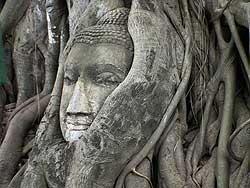Buddhism and ecology
by Martine Batchelor and Kerry Brown, The Times of India, Sep 18, 2010
New Delhi, India -- Dharma, for Buddhists, is the sacred law, morality and the teachings of the Buddha. It is also all things in nature. Cats, dogs, penguins, trees, humans, mosquitoes, sunlight, leaf dew are all dharmas. So at its very essence, Buddhism can be described as an ecological religion or a religious ecology.
 The principles of love, compassion and respect for all life, are familiar to the Western mind but in recent centuries, we have restricted them to humans only. Even the law of karma (cause and effect) has some place in our thinking although without the universal and inescapable power it is given in Buddhist thought. The law of karma ultimately places mind as the first cause. It is the maker and the shaper of our personal and global destiny.
The principles of love, compassion and respect for all life, are familiar to the Western mind but in recent centuries, we have restricted them to humans only. Even the law of karma (cause and effect) has some place in our thinking although without the universal and inescapable power it is given in Buddhist thought. The law of karma ultimately places mind as the first cause. It is the maker and the shaper of our personal and global destiny.
Our birth and existence is dependent on causes outside ourselves, inextricably linking us with the world and denying us any autonomous existence. Indeed when we think deeply enough, the borders between our self and the world wash away like water in water. We and all of nature are inseparable, entwined, one. Compassion for others should be as natural and instinctive as compassion for us and our own bodies.
This is perhaps the most striking and difficult idea of Buddhism and the one most misunderstood – that there is no independent individual self. Yet the individual self is one of the western world's most cherished beliefs and greatest source of suffering. It is what separates us from the world and causes us to cling to it with the stranglehold of the drowning. To be enlightened is to awaken from this delusion.
To transform the world, we must begin by transforming ourselves ... by discovering our true Buddha (enlightened) nature.
As the primacy of the individual and individual desire has continued to grow exponentially in the shadow of the industrialising world, two questions have arisen, says Timmerman: 'How can we deny people their right to self-fulfillment? Yet how can we survive on a planet of ten billion points of infinite greed? This is the point at which the more challenging aspects of Buddhism present 'a serious alternative basis for environmental thought and action'. Timmerman argues that to be a Buddhist today is a geopolitical act, taking us away from the ethos of the individual and its bondage to the consumer ethic and providing us 'with a working space within which to stand back from our aggressive culture and consider the alternative. This working space, with its ways of carefully considering and meditating on what we do, is part of what can be called 'non-violent thinking.'
His Holiness the Dalai Lama, in his Nobel Peace Prize acceptance speech said: "We must develop a sense of universal responsibility not only in the geographic sense, but also in respect to the different issues that confront our planet. Responsibility does not only lie with the leaders of our countries or with those who have been appointed or elected to do a particular job. It lies with each of us individually. Peace, for example, starts within each one of us. When we have inner peace, we can be at peace with those around us. When our community is in a state of peace, it can share that peace with neighbouring communities, and so on.
It is my dream that the entire Tibetan plateau should become a free refuge where humanity and nature can live in peace and in harmonious balance ... Tibet could become a creative centre for the promotion and development of peace."
Excerpt from Buddhism And Ecology, MLBD

 The principles of love, compassion and respect for all life, are familiar to the Western mind but in recent centuries, we have restricted them to humans only. Even the law of karma (cause and effect) has some place in our thinking although without the universal and inescapable power it is given in Buddhist thought. The law of karma ultimately places mind as the first cause. It is the maker and the shaper of our personal and global destiny.
The principles of love, compassion and respect for all life, are familiar to the Western mind but in recent centuries, we have restricted them to humans only. Even the law of karma (cause and effect) has some place in our thinking although without the universal and inescapable power it is given in Buddhist thought. The law of karma ultimately places mind as the first cause. It is the maker and the shaper of our personal and global destiny.